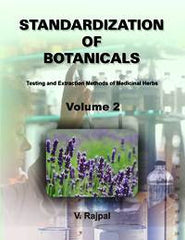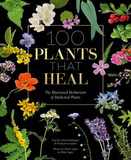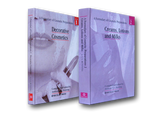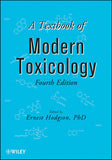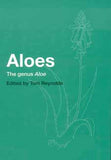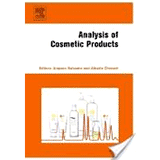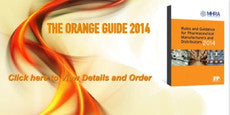Standardization of Botanicals, Vol. 2 by Dr. V. Rajpal
Testing of medicinal herbs and their derivatives like extracts, phytochemicals, oleoresins etc has all along been a difficult and controversial subject due to the complex nature of the active constituents of the medicinal herbs found wild or cultivated in various regions of the world. An effort is on to include, at least some testing methods, in various pharmacopoeias but there is still a wide gap between the medicinal herbs and their testing methods. This book containing 25 monographs of medicinal herbs fills that gap in knowledge base with detailed, ready to use and validated extraction processes and methods of testing to be performed in a well-equipped testing laboratory.Volume I with 25 monographs was published in 2002 which was perhaps one of the very few books providing specifications and testing methods for various types of herbal extracts like soft extracts, dry extracts and phytochemicals. Most of the data provided was based on the hands-on experience of the author Dr. V. Rajpal who has been constantly associated with the testing as well as processing of medicinal herbs and their derivatives since 1976 in an industrial setting. His experience of providing consultancy for setting up herb processing and testing laboratories led to his in-depth knowledge of problems faced by the herb processing factories and quality control laboratories.Since 2002 Dr. V. Rajpal had been working on 25 other commonly used medicinal herbs in India as well as other countries. He has collected all the data with latest national and international references to make the all-new 25 monographs complete and up-to-date.Each monograph provides the following information:
- Distribution and description of the plant
- Chemical constituents and chemical structures
- Extraction processes
- Specifications of extracts and phytochemicals
- Testing procedures, Biological activities
- Toxicity and safety aspects, Properties and uses
- Therapeutic indications, Dosage and References
ABOUT THE AUTHOR
Dr. Rajpal obtained his doctorate in phytochemistry in 1976 and since then has been associated with the herb processing and testing of botanicals, their extracts and phytochemicals in an industrial setting. He also provides consultancy services to various companies in this sector. He is presently working as a Technical Director with a company engaged in extraction of botanicals
WHO SHOULD BUY THIS BOOK
- Manufacturers of herbal extracts
- Manufacturers of herbal formulations
- Manufacturers of herbal cosmetics
- Manufacturers of nutritional supplements
- Testing laboratories
- Research Institutions
- Herb growers
- Academic institutions
- Regulatory affairs specialists
CONTENTS
Adhatoda vasica Nees
Distribution and Description
of the Plant
Chemical Constituents
EXTRACTION PROCESS
Specifications Sheet
Adhatoda vasica leaf (Vasaka) Dry Extract
TESTING METHODS
1. Identification of Alkaloids by HPTLC
2. Estimation of Vasicine by HPLC
3. Procedure for Estimation of Total Alkaloids
Biological Activities
TOXICITY AND SAFETY ASPECTS
PROPERTIES AND USES
THERAPEUTIC INDICATIONS
DOSAGE
REFERENCES
ADDITIONAL REFERENCES
--------------------------------------------------------------------------------
Aegle marmelos Linn
DISTRIBUTION AND DESCRIPTION OF THE PLANT
CHEMICAL CONSTITUENTS
EXTRACTION PROCESS
SPECIFICATIONS SHEET
Aegle marmelos Fruit Powder
TESTING METHODS
1. Imperatorin
2. Total Alkaloids
3. Mucilages
BIOLOGICAL ACTIVITIES
PROPERTIES AND USES
THERAPEUTIC INDICATIONS
DOSAGE
TOXICITY AND SAFETY ASPECTS
REFERENCES
--------------------------------------------------------------------------------
Aesculus hippocastanum
Distribution and Description of the Plant
Chemical Constituents
EXTRACTION PROCESSES
1. Extraction of Seeds
2. Extraction of Seed Skin (Integument)
Specifications Sheet
1. Aesculus hippocastanum Dry Extract – Spray dried powder
2. Beta Escin
TESTING METHODS
Estimation of Aescin in Aesculus Hippocastanum (Horsechestnut) Extract
BIOLOGICAL ACTIVITIES
SAFETY ASPECTS
PROPERTIES AND USES
THERAPEUTIC INDICATIONS
DOSAGE
REFERENCES
ADDITIONAL REFERENCES
--------------------------------------------------------------------------------
Ammi majus
DISTRIBUTION AND DESCRIPTION OF THE PLANT
CHEMICAL CONSTITUENTS
EXTRACTION PROCESS
Xanthotoxin (Methoxsalen)
Specifications Sheet
Xanthotoxin (Methoxsalen)
TESTING METHODS
Testing by HPLC Procedure
BIOLOGICAL ACTIVITIES
SAFETY ASPECTS
PROPERTIES AND USES
THERAPEUTIC INDICATIONS
DOSAGE
REFERENCES
--------------------------------------------------------------------------------
Artemisia annua
DISTRIBUTION AND DESCRIPTION OF THE PLANT
CHEMICAL CONSTITUENTS
EXTRACTION PROCESS
SPECIFICATIONS SHEET
1. Artemisia annua herb Thick Paste
2. Artemisinin
3. Artemether
4. Arteether
5. Artesunate
TESTING METHODS
Estimation of Artemisinin
BIOLOGICAL ACTIVITIES
TOXICITY AND SAFETY ASPECTS
PROPERTIES AND USES
THERAPEUTIC INDICATIONS
DOSAGE
REFERENCES
ADDITIONAL REFERENCES
--------------------------------------------------------------------------------
Asparagus racemosus Willd
DISTRIBUTION AND DESCRIPTION OF THE PLANT
CHEMICAL CONSTITUENTS
EXTRACTION PROCESS
SPECIFICATIONS SHEET
Asparagus racemosus (Shatavari) Dry Extract
TESTING METHODS
Estimation of Saponins
BIOLOGICAL ACTIVITIES
TOXICITY AND SAFETY ASPECTS
PROPERTIES AND USES
THERAPEUTIC INDICATIONS
DOSAGE
REFERENCES
ADDITIONAL REFERENCES
--------------------------------------------------------------------------------
Azadirachta indica A. Juss
DISTRIBUTION AND DESCRIPTION OF THE PLANT
CHEMICAL CONSTITUENTS
EXTRACTION PROCESSES
1. Extraction Process of Leaf Extract
2. Extraction Process of Bark Extract
3. Process of isolation Gedunin - an antimalarial compound of Neem bark
4. Extraction Process of Azadirachtin from Neem Seeds
SPECIFICATIONS SHEET
1. Azadirachta indica (Neem) Leaf Dry Extract
2. Azadirachta indica (Neem) Bark Dry Extract
3. Azadirachtin
4. Azadirachta indica (Neem) Seed Kernel Oil
TESTING METHODS
1. Thin Layer Chromatographic System of Azadirachtin
2. Determination of bitterness value in Neem leaves, bark and seed extracts
3. Determination of Total Bitters
4. Estimation of Azadirachtin In Neem Products by HPLC method
BIOLOGICAL ACTIVITIES
TOXICITY AND SAFETY ASPECTS
PROPERTIES AND USES
THERAPEUTIC INDICATIONS
DOSAGE
REFERENCES
ADDITIONAL REFERENCES
--------------------------------------------------------------------------------
Coleus forskohlii (Willd.) Briq
Distribution and Description of the Plant
Chemical Constituents
EXTRACTION PROCESS
Specifications Sheet
Coleus forskohlii Root Powder
TESTING METHODS
GLC Method of Assay of Forskolin
Biological Activities
PROPERTIES AND USES
THERAPEUTIC INDICATIONS
REFERENCES
--------------------------------------------------------------------------------
Crataeva nurvala Buch – Ham
Distribution and Description of the Plant
Chemical Constituents
EXTRACTION PROCESS
Specifications Sheet
Crataeva nurvala Dry Extract
TESTING METHODS
1. Estimation of Saponin in Crataeva
Nurvala Extract
2. Estimation of Lupeol by HPLC
Biological Activities
PROPERTIES AND USES
THERAPEUTIC INDICATIONS
DOSAGE
REFERENCES
--------------------------------------------------------------------------------
Curcuma longa Linn
DISTRIBUTION AND DESCRIPTION OF THE PLANT
Chemical Constituents
EXTRACTION PROCESSES
Extraction Process of Curcuminoids 95.0% and above
Specifications Sheet
1. Curcuminoids
2. Curcuma longa Dry Extract
3. Turmeric (Curcuma longa) Soft Extract (Oleoresin)
4. Curcuma longa Rhizomes Oil
TESTING METHODS
1. Estimation Of Curcumin and Colour Value by Spectrophotometric Methods
2. Estimation by HPLC
3. Estimation by Alkalimetric Method [E. Merck]
4. TLC System for Curcuminoids
Biological Activities
TOXICITY STUDIES AND SAFETY ASPECTS
PROPERTIES AND USES
THERAPEUTIC INDICATIONS
DOSAGE
REFERENCES
ADDITIONAL REFERENCES
--------------------------------------------------------------------------------
Gloriosa superba Linn
Distribution and Description of the Plant
Chemical Constituents
EXTRACTION PROCESS
Specifications Sheet
1. Colchicine
2. Gloriosa superba rhizomes Dry Extract
TESTING METHODS
1. Estimation of Colchicine by HPLC Procedure
2. TLC System for Colchicine and other Alkaloids
Biological Activities
SAFETY ASPECTS
PROPERTIES AND USES
THERAPEUTIC INDICATIONS
REFERENCES
ADDITIONAL REFERENCES
--------------------------------------------------------------------------------
Glycine max Merrill
Distribution and Description of the Plant
Chemical Constituents
PROCESS FLOW OF SOYA BEAN EXTRACTION
EXTRACTION PROCESSES
1. Solvent Extraction Process
2. Isolation and Purification of Lecithin
3. Isolation of Choline Phosphatide
4. Preparation of Liposomes
5. Characterization of Liposomes
6. Process of Soya – Phytochemical Extract (SPE)
7. Process for manufacturing Tocopherols and Phytosterols from oil refineries waste
SPECIFICATIONS SHEET
1. Soya bean Extract
2. Soya Isoflavones Powder
3. Soya Lecithin Paste
4. Soya Lecithin Powder
5. Soya sterols Powder
6. D-Delta-Rich mixed Tocopherols
TESTING METHODS
1. Estimation Method of Soya Sterols in Various Fractions of Soya
2. Assay for Total Tocopherol
3. G C Determination of Sterols and Tocopherols In D.O
4. HPLC Analysis Procedure of Isoflavones in Extract or Supplements
5. Estimation of Saponins in Soya Phytochemical Extract [SPE] and other Soya Products
6. HPLC Analysis of Choline Phosphatide in Commercial Lecithin Paste / Powder / Preparations
Biological Activities
CONTRAINDICATIONS AND SAFETY ASPECTS
TOXICITY AND SAFETY
PROPERTIES AND USES
DOSAGE
REFERENCES
ADDITIONAL REFERENCES
--------------------------------------------------------------------------------
Holarrhena antidysenterica Wall ex DC
Distribution and Description of the Plant
Chemical Constituents
EXTRACTION PROCESS
Specifications Sheet
Holarrhena antidysenterica (Kurchi) Bark Dry Extract
TESTING METHODS
Estimation of Total Alkaloids
Biological Activities
TOXICITY AND SAFETY ASPECTS
PROPERTIES AND USES
THERAPEUTIC INDICATIONS
DOSAGE
REFERENCES
ADDITIONAL REFERENCES
--------------------------------------------------------------------------------
Lagerstroemia speciosa [L.] Pers.
Distribution and Description of the Plant
Chemical Constituents
EXTRACTION PROCESS
Specifications Sheet
Lagerstroemia speciosa (Banaba) leaves Dry Extract-spray dried powder
TESTING METHODS
1. Estimation of Corosolic Acid by HPLC
2. Estimation of Total Tannins
Biological Activities
TOXICITY AND SAFETY ASPECTS
PROPERTIES AND USES
THERAPEUTIC INDICATIONS
DOSAGE
REFERENCES
ADDITIONAL REFERENCES
--------------------------------------------------------------------------------
Matricaria recutita Linn
Distribution and Description of the Plant
Chemical Constituents
EXTRACTION PROCESS
SPECIFICATIONS SHEET
1. Matricaria recutita flowers Soft Extract
2. Matricaria chamomilla (Chamomile) Oil
TESTING METHODS
1. TLC System for Essential Oil
2. TLC System For Flavonoids
Biological Activities
SAFETY AND TOXICITY ASPECTS
PROPERTIES AND USES
THERAPEUTIC INDICATIONS
REFERENCES
ADDITIONAL REFERENCES
--------------------------------------------------------------------------------
Ocimum sanctum Linn
Distribution and Description of the Plant
Chemical Constituents
EXTRACTION PROCESSES
1. Oleoresin
2. Process for Dry Extract
3. Process of Ocimum sanctum leaves Juice Extract
Specifications Sheet
1. Ocimum sanctum Leaves Dry Extract
2. Processed Ocimum sanctum (Tulsi) leaves Thick Paste (Oleoresin)
TESTING METHODS
1. Estimation of Ursolic Acid in Extract
2. Determination of volatile oil and its analysis
Biological Activities
PROPERTIES AND USES
THERAPEUTIC INDICATIONS
DOSAGE
REFERENCES
ADDITIONAL REFERENCES
--------------------------------------------------------------------------------
Phyllanthus emblica Linn
Distribution and Description of the Plant
Chemical Constituents
EXTRACTION PROCESSES
1. Phyllanthus emblica extract powder
2. Extraction Process of Oil Soluble Phyllanthus emblica Extract
Specifications Sheet
1. Processed Phyllanthus emblica (Amla) Fruit Dry Powder
2. Emblica officinalis (Fresh Amla Juice) Dry Extract – Spray Dried Powder
3. Phyllanthus emblica (Amla) fruit oil Soluble Extract
TESTING METHODS
1. Determination of Tannins by the method published by WHO
2. Testing Procedure of Tannins by U.S.S.R.P X Method
3. Analysis of Tannins by High performance capillary electrophoresis [HPCE]
4. Assay Of Ascorbic Acid by HPLC
5. Estimation of Ascorbic acid by IP-1996 method p. 67
6. TLC System for Ascorbic Acid
7. TLC System for Gallic Acid
Biological Activities
TOXICITY AND SAFETY ASPECTS
PROPERTIES AND USES
THERAPEUTIC INDICATIONS
DOSAGE
REFERENCES
ADDITIONAL REFERENCES
--------------------------------------------------------------------------------
Piper nigrum
Distribution and Description of the Plant
Chemical Constituents
EXTRACTION PROCESSES
1. Extraction Process for Oleoresin
2. Extraction Process for Dry Powder
3. Extraction of Piperine
Specifications Sheet
Piper nigrum Dry Extract
TESTING METHODS
1. Estimation of Piperine in Piper Nigrum Dry Extract
2. Estimation of Piperine in Piper Nigrum Extract by HPLC
3. Estimation by Spectrometric Method
Biological Activities
SAFETY ASPECTS
PROPERTIES AND USES
THERAPEUTIC INDICATIONS
DOSAGE
REFERENCES
ADDITIONAL REFERENCES
--------------------------------------------------------------------------------
Podophyllum emodi Wallich
Distribution and Description of the Plant
Chemical Constituents
EXTRACTION PROCESSES
1. Podophyllum Resin
2. Podophyllotoxin
Specifications Sheet
1. Podophyllum Resin
2. Podophyllotoxin
3. Etoposide
TESTING METHODS
1. Estimation of Podophyllotoxin by HPLC Procedure
2. By TLC – UV Spectrophotometer
3. Assay as per IP- 1966 Procedure
Biological Activities
TOXICITY AND SAFETY ASPECTS
PROPERTIES AND USES
THERAPEUTIC INDICATIONS
DOSAGE
REFERENCES
ADDITIONAL REFERENCES
--------------------------------------------------------------------------------
Psoralea corylifolia Linn
Distribution and Description of the Plant
Chemical Constituents
EXTRACTION PROCESS
For Dry Extract
Specifications Sheet
Psoralea corylifolia (Babchi) Dry Extract
TESTING METHODS
1. By HPLC Method
2. By Spectrophotometric Method
Biological Activities
PROPERTIES AND USES
THERAPEUTIC FUNCTIONS
DOSAGE
TOXICITY AND SAFETY ASPECTS
REFERENCES
ADDITIONAL REFERENCES
--------------------------------------------------------------------------------
Pterocarpus marsupium Roxb.
Distribution and Description of the Plant
Chemical Constituents
EXTRACTION PROCESS
For Dry Extract
Specifications Sheet
Pterocarpus marsupium Wood Dry Extract
TESTING METHODS
1. Estimation of Total Tannin Compounds
2. Analysis of Epicatechin and other Flavonoids by Gas Chromatography as Trimethylsilyl Derivatives
3. HPLC method of analysis of – Epicatechin
Biological Activities
TOXICITY AND SAFETY ASPECTS
PROPERTIES AND USES
THERAPEUTIC FUNCTIONS
DOSAGE
REFERENCES
ADDITIONAL REFERENCES
--------------------------------------------------------------------------------
Sida cordifolia Linn
Distribution and Description of the Plant
Chemical Constituents
EXTRACTION PROCESS
Specifications Sheet
Sida cordifolia root Dry Extract
TESTING METHODS
1. Ecdysterone by HPTLC - Indian Herbal Pharmacopoeia, 1999, Vol.II
2. Procedure for Estimation of Total Alkaloids as Ephedrine
Biological Activities
PROPERTIES AND USES
THERAPEUTIC FUNCTIONS
DOSAGE
TOXICITY
SAFETY ASPECTS AND ADULTERANTS
REFERENCES
ADDITIONAL REFERENCES
--------------------------------------------------------------------------------
Taxus wallichiana Zucc
Distribution and Description of the Plant
Chemical Constituents
EXTRACTION PROCESS
Specifications Sheet
Taxol
TESTING METHODS
Biological Activities
TOXICITY AND SAFETY ASPECTS
THERAPEUTIC INDICATIONS
DOSAGE
REFERENCES
ADDITIONAL REFERENCES
--------------------------------------------------------------------------------
Terminalia arjuna (Roxb.) Wight & Arnot
Distribution and Description of the Plant
Chemical Constituents
EXTRACTION PROCESS
Specifications Sheet
Terminalia arjuna Dry Extract
TESTING METHODS
1. Testing Procedure of Tannins (By U.S.S.R.P. Method) In Terminalia arjuna Bark (Arjuna) Extract
2. Testing Procedure of Triterpenic Glycosides by Liberating Sapogenins
3. Testing Procedure of Triterpenic Glycosides by Gravimetric Method
Biological Activities
PROPERTIES AND USES
THERAPEUTIC INDICATIONS
DOSAGE
REFERENCES
ADDITIONAL REFERENCES
--------------------------------------------------------------------------------
Terminalia chebula Retz
Distribution and Description of the Plant
Chemical Constituents
EXTRACTION PROCESSES
1. Extraction process of Tannic Acid
2. Extraction process of Ellagic Acid
Specifications Sheet
1. Terminalia chebula Dry Extract
2. Tannic acid-Pharmacopoeial grade
TESTING METHODS
1. Testing Procedure of Tannins (By U.S.S.R.P. Method) in Terminalia chebula Fruit (Harir) Extract
2. HPLC Procedure for Analysis of Tannins P. 1755 U.S.P XXIV
Biological Activities
PROPERTIES AND USES
THERAPEUTIC INDICATIONS
DOSAGE
REFERENCES
--------------------------------------------------------------------------------
ANNEXURES
Annexure – 1 Ayurveda Institutes In India
Annexure – 2 World Herb Associations
Index of Chemical Constituents

